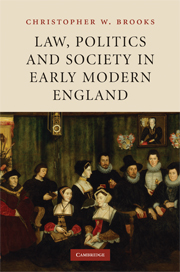Book contents
- Frontmatter
- Contents
- Preface
- Abbreviations and conventions
- 1 English history and the history of English law 1485–1642
- 2 Courts, lawyers and legal thought under the early Tudors
- 3 The initiatives of the crown and the break from Rome
- 4 Political realities and legal discourse in the later sixteenth century
- 5 The politics of jurisdiction I: the liberty of the subject and the ecclesiastical polity 1560 – c. 1610
- 6 The politics of jurisdiction II: multiple kingdoms and questions about royal authority
- 7 The absoluta potestas of a sovereign and the liberty of the subject: law and political controversy in the 1620s
- 8 The degeneration of civil society into a state of war 1629–1642
- 9 Law and ‘community’
- 10 The aristocracy, the gentry and the rule of law
- 11 Economic and tenurial relationships
- 12 The household and its members
- 13 The person, the community and the state
- 14 Conclusion
- Manuscript bibliography
- Index
- References
10 - The aristocracy, the gentry and the rule of law
Published online by Cambridge University Press: 06 July 2010
- Frontmatter
- Contents
- Preface
- Abbreviations and conventions
- 1 English history and the history of English law 1485–1642
- 2 Courts, lawyers and legal thought under the early Tudors
- 3 The initiatives of the crown and the break from Rome
- 4 Political realities and legal discourse in the later sixteenth century
- 5 The politics of jurisdiction I: the liberty of the subject and the ecclesiastical polity 1560 – c. 1610
- 6 The politics of jurisdiction II: multiple kingdoms and questions about royal authority
- 7 The absoluta potestas of a sovereign and the liberty of the subject: law and political controversy in the 1620s
- 8 The degeneration of civil society into a state of war 1629–1642
- 9 Law and ‘community’
- 10 The aristocracy, the gentry and the rule of law
- 11 Economic and tenurial relationships
- 12 The household and its members
- 13 The person, the community and the state
- 14 Conclusion
- Manuscript bibliography
- Index
- References
Summary
The problem of the ‘over-mighty’
A simple observation that emerges from the previous survey of early modern franchise jurisdictions is that the landed elite, the aristocracy and gentry, enjoyed surprisingly little power and influence directly as a result of being lords of the manor. Although advanced without reference to questions about land tenure and economic relationships that will be discussed in the next chapter, the point can be illustrated by some striking examples from the fifteenth century. On 30 December 1460, Richard of York, the principal antagonist of King Henry VI in the Wars of the Roses, was slain within the precincts of his manor of Wakefield, evidently unable to depend on support from his tenants, copyholders who had long enjoyed considerable control over their holdings. Similarly, given the nature of the charge that was used at Fountains Abbey at about the same time, it is not surprising that the jury at another Yorkshire manor, Aldborough, presented some of their fellow tenants for riding in support of Richard, the earl of Salisbury and Sir John Neville contrary to proclamations and mandates of King Henry.
It would probably not be technically accurate to describe any period covered by this book as one in which England was simply a collection of noble fiefdoms, and as we shall see, the common law took only limited notice of the status terms associated with either peers of the realm (earl, baron, duke, etc.), or country squires (knight, esquire, gentleman).
- Type
- Chapter
- Information
- Law, Politics and Society in Early Modern England , pp. 278 - 306Publisher: Cambridge University PressPrint publication year: 2009

